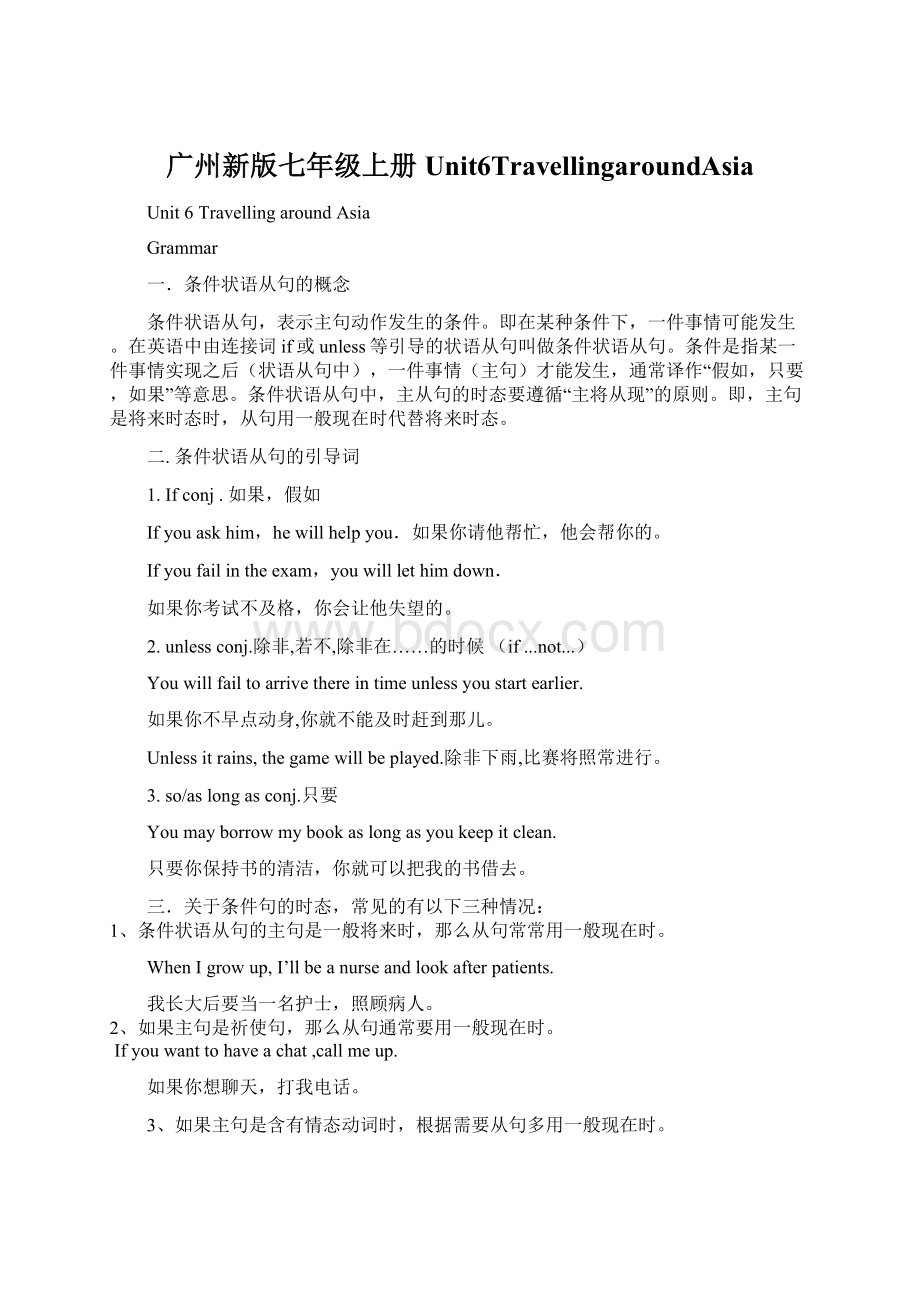广州新版七年级上册Unit6TravellingaroundAsia.docx
《广州新版七年级上册Unit6TravellingaroundAsia.docx》由会员分享,可在线阅读,更多相关《广州新版七年级上册Unit6TravellingaroundAsia.docx(14页珍藏版)》请在冰豆网上搜索。

广州新版七年级上册Unit6TravellingaroundAsia
Unit6TravellingaroundAsia
Grammar
一.条件状语从句的概念
条件状语从句,表示主句动作发生的条件。
即在某种条件下,一件事情可能发生。
在英语中由连接词if或unless等引导的状语从句叫做条件状语从句。
条件是指某一件事情实现之后(状语从句中),一件事情(主句)才能发生,通常译作“假如,只要,如果”等意思。
条件状语从句中,主从句的时态要遵循“主将从现”的原则。
即,主句是将来时态时,从句用一般现在时代替将来时态。
二.条件状语从句的引导词
1.Ifconj.如果,假如
Ifyouaskhim,hewillhelpyou.如果你请他帮忙,他会帮你的。
Ifyoufailintheexam,youwilllethimdown.
如果你考试不及格,你会让他失望的。
2.unlessconj.除非,若不,除非在……的时候(if...not...)
Youwillfailtoarrivethereintimeunlessyoustartearlier.
如果你不早点动身,你就不能及时赶到那儿。
Unlessitrains,thegamewillbeplayed.除非下雨,比赛将照常进行。
3.so/aslongasconj.只要
Youmayborrowmybookaslongasyoukeepitclean.
只要你保持书的清洁,你就可以把我的书借去。
三.关于条件句的时态,常见的有以下三种情况:
1、条件状语从句的主句是一般将来时,那么从句常常用一般现在时。
WhenIgrowup,I’llbeanurseandlookafterpatients.
我长大后要当一名护士,照顾病人。
2、如果主句是祈使句,那么从句通常要用一般现在时。
Ifyouwanttohaveachat,callmeup.
如果你想聊天,打我电话。
3、如果主句是含有情态动词时,根据需要从句多用一般现在时。
Youshouldbequietwhenyouareinthereadingroom.
在阅览室时应保持安静。
四.知识拓展
1.在以when,before,assoonas等引导的时间状语从句,也适用“主将从现”原则,即如果主句是一般将来时,从句则用一般现在时。
I'lltellherthegoodnewswhenshecomesback.
当她回来的时候,我将把这个好消息告诉她。
shewillgiveyouacallassoonasshereturns.
她一回来就会给你电话。
2.If条件句的同义句:
祈使句,and/or+将来时态的陈述句。
Workhard,andyouwillmakegreatprogress.=
Ifyouworkhard,youwillmakegreatprogress.
如果你努力学习,你才会取得大的进步。
Hurryup,oryouwillbelate.=Ifyoudon’thurryup.youwillbelate.
如果你不快点,你就要迟到了。
Unit6TravellingaroundAsia
Reading
基础部分:
1.ReadinganarticleaboutShanghaiinatravelguide.读旅行指南中一篇有关上海的文章。
travelguide“旅游指南,旅游手册”,可以简称为guide.
Ineedatravelguide.Atravelguideisveryimportantforyou.
此外,guide作可数名词,意为“手册,指南,导游”;作及物动词,意为“引着参观”。
Makeatravelguide.做一本旅游手册。
Iwillbuyaguidefortravellers.我将买一本旅游指南。
Sheguidesthetouristsaroundthecity.她引着游客参观这个城市。
2.ListentoagirltalkingaboutthreecitiesinAsia.听一个女孩谈论亚洲三个城市。
Asia名词,意为“亚洲”;Asian,“亚洲的,严洲人的;亚洲人”。
EastAsia东亚ChinaisinEastAsia.中国在东亚。
ChinaisanAsiancountry.WeareAsians.
3.Tellyourclassmateaboutsomeplacesofinterest.告诉你同学一些名胜。
placeofinterest“名胜”
TherearemanyplacesofinterestinChina.
TheGreatWallisaplaceofinterest.
4.Myheadwasmadethere.我的头就产于那儿。
bemadein+地点,意为“产于某地”,由于there是地点副词,故去掉介词in.
成品+bemadein+地点
产于某地
原料+bemadeinto+成品
……被制成……
成品+bemadeof+原料(看得出,物理)
由……制成
成品+bemadeby+制造者
……被……制造
成品+bemadefrom+原料(看不出,化学)
由……制成
MypianoismadeinBeijing.Thebirthdaycakeismadebymymother.
Thetableismadeofwood.Wineismadefromgrapes.
Grapesaremadeintowine.ThebikeismadeinChina.
5.Shanghaiisoneofthelargestcitiesintheworld.上海是世界上最大的城市之一。
“oneof+the+形容词最高级+复数名词/代词”意为“最……之一”,当其作主语时,谓语动词用单数形式。
Tomisoneofthetallestboysinourclass.Oneofushasatravelguide.
6.Ifyoulikesightseeing,youwillloveit!
如果你喜欢观光,你会爱上它的!
(1)本句为含有if引导的条件状语从句的主从复合句,从句用一般现在时,主句要用一般将来时。
主句也可以用祈使句或含有情态动词的句子。
if意为“如果”。
Ifitdoesn’traintomorrow,I’llvisittheGreatWallwithyou.
(2)sightseeing名词,“观光、游览”
gosightseeing去观光 dosomesightseeing游览
Whydoyougosightseeing?
We’regoingtodosomesightseeingbecausewelikeitsculture.
7.People’sSquareisinthecentreofShanghai.人民广场在上海的中心。
inthecentreof意为“在……的中心”Thereisaparkinthecentreofthecity.
(1)at/inthecentreof强调“在……中心,在……中央”。
inthemiddleof强调“在……(时间、长度、过程等)的中间”。
Helivesinthecentreofthetown.Don’tstandinthemiddleoftheroad.
(2)centre名词,意为“中心点,中心”,强调的是一个点,习惯上指空间的“中央”,如圆、球体、靶子的“正中心”;另外,centre还可表示中心区、中心站或重要活动的中心。
ThecentreofthecircletheshoppingcentreHongKongisashoppingcentre.
8.Itisalargepublicareawithgreengrass,fountainsandbirds.它是有绿草、喷泉和鸟儿的大公共地区。
alargepublicarea“大型公众区域”,我们常用publicarea来指“公共场所、公共区域”area名词,“区域;地区”,还可指“面积”
Theywillbuildagardeninthisarea.他们将在这个区域内建一座花园。
Insomeareas,thechildrenwalktoschool.在有些地区,孩子们走着去上学。
介词with表示“带有”的意思。
Theteachercamesinwithabookinhishand.老师走了进来,手里拿了一本书。
9.IfyouvisitPeople’sSquare,youcanalsoseefamousbuildingaroundit,suchastheShanghaiGuandTheatreandtheShanghaiMuseum.如果你到了人民广场游览,你还可以看到周边的著名建筑,如上海大剧院和上海博物馆。
介词“around”意思是“在……周围” Theywentaroundthetownandlookedattheshops.
可数名词building,意为“建筑物”;及物动词build,意为“ 建筑,建造”。
Theywillbuildmanybuildingsinourschool.
Therearetwoteachingbuildingsinourschool.tallbuildings高楼
10.TheBundiswhereoldShanghaimeetsnewShanghai.外滩是新旧上海交汇的地方。
这是一个where引导的表语从句,相当于一个名词。
是高中语法知识,理解含义即可。
11.IfyouwalkalongtheBund,youwillseemanyoldbuildings.如果你沿着外滩漫步,你将看到很多老建筑。
walkalong“沿着……走”Whenwewalkedalongthebeach,wesawawhale.
Walkalongthisroad,andtakethesecondturningontheright.
12.ThePudongNewArea,justacrosstheHuangpuRiver,hasmanymodernbuildings.就在黄浦江对岸的浦东新区有着很多现代建筑。
(1)副词just,意为“正好,恰好”,常用于肯定句。
That’sjustwhatIwanted.
It’sjustseveno’clock.
(2)across介词,意为“在……对面”;acrossfrom意为“在……对过”
TheSmithslivejustacrosstheriver.Theyliveacrossfromus.
across作介词“穿过,横过”之意,着重从事物表过的一边到另一边;介词through意为“穿过”,但它着重指从空间一头到另一头。
Don’twalkacrosstheroad.Lightcomesinthroughthewindow.
13.Atnight,thesetallbuildingslightuptheskyineverydirection.晚上,这些高楼照亮了四面八方的天空。
(1)atnight“夜晚,在夜里”
(2)lightup意为“点亮,照亮” Firelightsuptheroom.
It’stimetolightupthecandle.
light动词,意为“照亮,使明亮”,过去式为lighted/lit.
light名词,意为“光,光线” Lighttravelsfasterthansound.
light形容词,意为“轻的,浅色的,明亮的” lightmusiclightgreenalightclassroom明亮的教室
direction可数名词,意为“方向”。
Soundcomesinthedirection.
Helooksattheroomineverydirection.他看看房子四周。
注:
表示“朝……方向”,用介词in,而不用to.inalldirections=ineverydirection.四面八方
14.YuGardenisatraditionalgarden.豫园是一个传统的花园。
形容词traditional意为“传统的”。
DumplingsaretraditionalfoodinChina.
名词“tradition”意为“传统”。
Wehavelotsoftraditions.
15.Ifyouenjoyhistoryandnaturalbeauty.如要你喜爱历史和自然美
形容词natural,意为“自然的,天然的”;名词nature,意为“自然,自然界”
名词beauty,意为“美人,美的东西;美丽”;形容词beautiful,意为“美的,优美的”
Therearemanyplantsinthenaturalworld.Wealllikenaturalbeauty.
Natureisthemostbeautifulinspring.naturalgas天然气naturalscience自然科学
naturalbeauty自然美 beautyshop美容院
16.Youcanalsobuydifferentsnacksjustoutsidethegarden.你也能在花园外买到不同的小吃。
介词outside,意为“在……外面”,反义词为inside.
相关短语:
attheoutside至多,充其量 outsideandin里里外外 outsidein彻底的
Hegoesoutsidethehouse.Pleasewaitoutsidetheschoolgate.
17.Sightseeingusuallyrefersto……观光通常是指referto意为“提到,涉及,指的是”
WhenIsaythething,Idon’trefertoyou.当我说这件事时,我不是指你。
Pleasedon’trefertoitagain.(回忆:
payforit)
refer…to…意为“把……提交给……”,“把……归功于……”(相当于own…to…),此处refer是及物动词。
Theyreferthethieftothepolice.他们把小偷交给了警察。
18. WhereelsecanIgo?
我还可以去哪儿?
通常else意为“别的,另外”,修饰不定代词、疑问代词或疑问副词,通常后置。
Whatelsedoyouwant?
你还想要什么?
Anythingelse?
还有别的吗?
else与other
else常用于修饰不定代词、疑问代词或疑问副词,也可修饰all,much,little等词,放在其后,作后置定语。
此外,else还可以构成名词所有格,即else’s,意为“另外的,其他的人或物的”。
Whydidn’tyoucome?
Everyoneelsewashere.
I’mtakingafewclothesandsomebooks,notmuchelse.
Thatmustbesomeoneelse’spen.It’snotmyeldersister’s.
other作形容词,用以修饰名词或代词,作定语;此外,other可作代词,可以单独作主语、宾语、表语,其复数形式为others.
WelearnChinese,maths,Englishandsomeothersubjectsatschool.
Somestudentsareplayingunderthetree,othersareflyingkitesoverthere.
提高部分:
19. PeopleinBeijinglikeeatingdumpings.北京人喜欢吃水饺。
介词短语inBeijing,意为“在北京”。
英语中介词短语作定语时,常后置。
Thestudentsondutyalwayscomeearly.值日的学生总是早来。
eatingdumplings是动名词短语,意为“吃水饺”,动名词在句中可以做主语、宾语或表语。
作主语时,谓语动词用单数。
Ilikeeatingicecream.Eatingtoomuchisn’tgoodforyou.
Myhobbyiscollectingstamps.
dumping可数名词,意为“水饺”,常用复数形式dumplings.Ilikeporkdumplings.
20.Therearefamoustemples.有著名的寺庙。
temple可数名词,意为“庙;寺”;此外,还有“太阳穴,鬓角”之意。
Mytemplesache.
21.Themainclausetalksaboutthelikelyresult.主句谈论可能的结果。
(1)talkabout意为“谈论”。
Let’stalkaboutthisquestion.
talkto/withsb.意为“与某人交谈”。
Talkto指一方主动和对方说话;talkwith指双方互动在交谈。
talkof意为“谈到,涉及”
(2)likely形容词,意为“可能的”,可以作定语或构成belikelytodosth.结构,likely在此结构中作表语。
Thelikelytimetofindhimisatnight.
Whoislikelytowinthematch?
likely表示有充分根据的预测,possible指客观上潜在的可能性.
likely既可由人作主语,也可由物作主语,通常用于Itislikelythat…中;possible不能由人做主语。
Heislikelytocomelate.
It'spossibleforhimtocomeearly.
22.Isometimesbringthewrongbookstoschool.我有时候上学带错书。
bring“带来”,是指把某物从别的地方带到说话的地方来。
Take“带走”,get/fetch“去取”。
Canyoubringyourphotostoschool?
23.Iwasawayfromschooltoday.我今天离开了学校。
beawayfrom离开
Heisawayfromhome.Myelderbrotherhasbeenawayfromusfortwoyears.
24.Ialwaysfeeltiredinthemorning.我在早上总是觉得累。
feeltired意为“感到累”,feel是连系动词(感官动词),其后常跟形容词作表语。
Thesilkdressfeelsoft.
25.Idonotknowwhatthiswordmean.我不知道这个单词是什么意思。
(1)mean及物动词,意为“意思是”;名词为meaning. What’sthemeaningof…?
意为“……的意思是什么?
”
Whatdoesthiswordmean?
=Whatdoyoumeanbythisword?
(2)whatthiswordmeans在句中作宾语,称之为宾语从句。
What是引导词,宾语从句用陈述语序。
Iknowwherehelives.
26.Mum’sadvice…妈妈的建议 advice不可数名词,意为“建议;劝告;忠告”,表示“一条建议”用apieceofadvice.
givesb.advice/giveadvicetosb.给某人提建议
givesb.adviceonsth.在某方面给某人提建议
asksb.foradvice征求某人的意见
take/followsb.’sadvice接受某人的意思
advice的动词形式为adviseadvisesbtodosth.
如:
Headvisesmetogetupearly.
27.…youwillknowwhichbookstobring,……你会知道带哪些书。
Whichbookstobring是疑问词与不定式连用,作动词know的宾语。
在英语中,动词不定式可以用在疑问词what,how,where,which等后面,在句中作宾语等。
Idon’tknowwhattodo.Canyoutellmehowtogettothelibrary.
28.Ifyoumakethewheelsround…如果你让轮子变圆……
makethewheelsround意为“使轮子变圆”make+宾语+宾补
Hemakesmehappy.
make+宾语+形容词做宾补Rainydaysmakemesad.
make+宾语+动词原形(省to不定式作宾补)Tomoftenmakesuslaugh.
29.Theseedswillgrowifyouplanttheminthesoil.如果你把它们种在土壤里,这些种子会生长。
plant及物动词,意为“种植”,一般指“栽上,种下”,是一种涉及时间